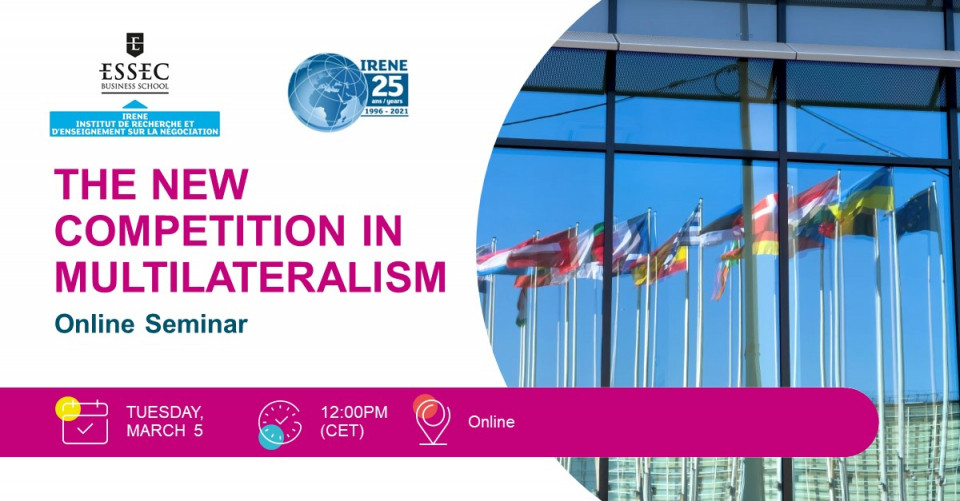
Dear alumni,
ESSEC IRENE would like to invite you to a special online seminar co-sponsored by IRENE’s Asia Program and ESSEC Center on Geopolitics, Defense & Leadership:
The New Competition in Multilateralism
🗓️ Date: Tuesday, March 5th, 2024
🕐 Time: 12h00 - 14h00 (CET)
🖥️ Format: Online
🎟️ Registration: Please register by filling out the dedicated registration form HERE
Additional information about the seminar can be found HERE
The Ukrainian war that began in February 2022 introduced a fundamental rupture in international relations: the return of war in the European space, the subsequent return of the United States to the Old Continent, and the new enlargement of NATO (Sweden, Finland); a series of Western sanctions against Moscow on an unprecedented scale; a partial interruption of world trade with serious food constraints for several countries in the South; a redistribution of the cards on the energy level; a return of reflections on strategic autonomy and therefore of a possible economic decoupling, not to forget crises in Gaza and East Asia.
Furthermore, at least two new structuring dividing lines have appeared:
- With the “limitless” alliance proclaimed on the eve of the war by the Russian and Chinese presidents, the Iranian military support for Moscow or the Turkish ambiguity, in addition to the new crisis in the Middle East, the question arises of an assumed division of the world between democracies and authoritarian regimes. Today we fear the opening of new fronts, particularly in the Taiwan Strait.
- After the refusal of several Southern countries to apply sanctions against Russia, questions arise about the increasingly explicit break between the most developed countries of the G7 and their allies on the one hand, and what is now commonly called the “Global South” on the other hand.
Today we fear that many in the South will refuse to support developed democracies in the event of confrontation with dictatorships.
Do these developments and divisions mean the end of globalization and multilateralism? Is it the end of a historical cycle that started in 1945? Can we still avoid divisions or even wars?
The past few years have also shown an increasing diplomatic activity, with multiple international gatherings such as G7, G20, and the now enlarged BRICS. New initiatives have also been enhanced, including the Infrastructure Partnership for the Sustainable Development Goals (IPEF), the Regional Comprehensive Economic Partnership (RCEP), and the EU’s Global Gateway.
This new ESSEC IRENE seminar will reflect on these questions, articulating them around three main avenues:
- How can G7 countries take the initiative to revitalize multilateralism and global dialogue?
- How can we talk with the South, which is now defiant and leaning towards the richest countries, and find the path to essential cooperation with it?
- What role can Europe and Japan play in this dynamic, as a Sino-American confrontation emerges weighing on many sectors of international relations?
Program
Introduction: Prof. Aurélien Colson, Professor of Political Science and Director of the Institute for Research and Education on Negotiation (IRENE) at ESSEC Business School.
Moderator: Prof. Philippe Le Corre, Affiliated Professor at ESSEC, Asia Program Coordinator at IRENE, and Senior Fellow, Asia Society Policy Institute
Keynote: Sir Paul Tucker (Harvard University), author of “Global Discord” (Princeton University Press) and former Deputy Governor of the Bank of England
Panel:
- International consequences of multiple crises Amb. Jean-Maurice Ripert, Ambassadeur de France, former French Ambassador to the United Nations, to China and Russia; former EU Ambassador to Turkey.
- Asia and the new South Amb. Masafumi Ishii, former Ambassador of Japan to Indonesia, Visiting Professor at Gakushuin University in Tokyo, Japan.
- Multilateralism and Regional crises, interconnected? Prof. Frédéric Charillon, professor of Political science at ESSEC and University Paris-Cité.
Concluding remarks: Philippe Le Corre (ESSEC)
Please find the full program and biographies of the speakers HERE.
Registration required 👇
If you have any issues with your registration or any questions, please contact us by e-mail at anita.maksymchuk@essec.edu.
📸 ESSEC Alumni may use photos and videos taken during this event in its various communication media (brochures, newsletters, articles, Reflets magazine, social media, websites, etc.). If you do not wish to be filmed or photographed, please inform us by e-mail (anita.maksymchuk@essec.edu) before the event.




